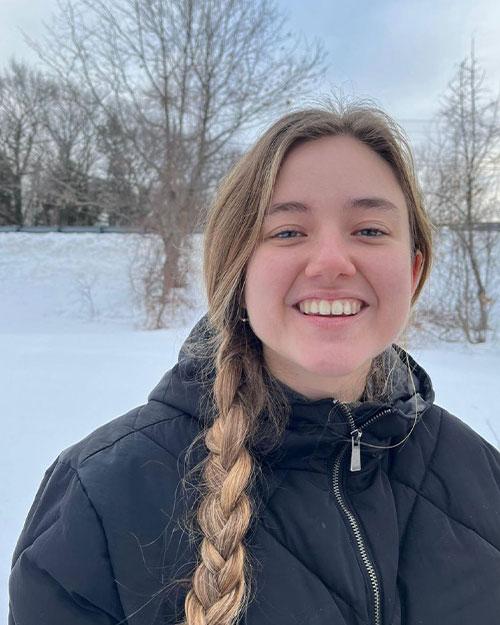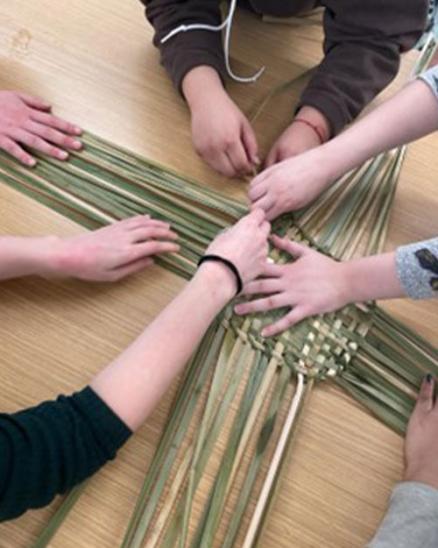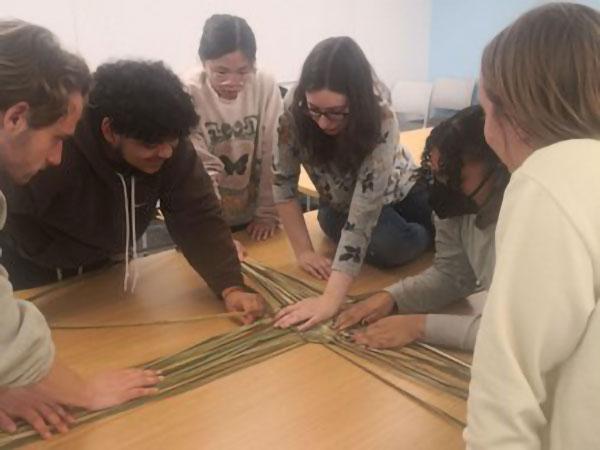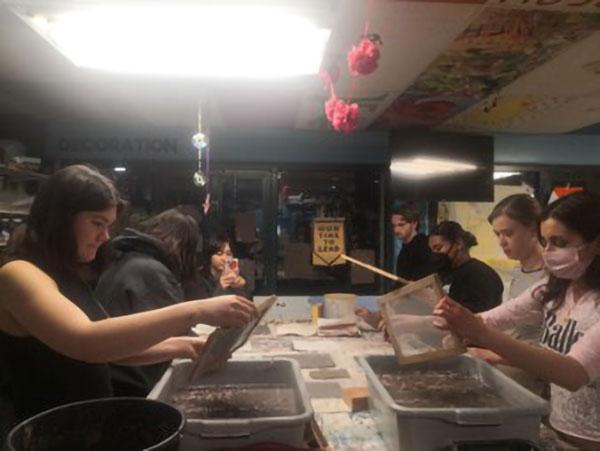Instructor Spotlight: Laura Harvey

Tell us about yourself and what inspired you to teach this course
Since I first read Braiding Sweetgrass by Robin Wall Kimmerer three years ago, I have regularly returned to specific chapters for practical, emotional and spiritual guidance. It has been a very important lens through which I approach my artwork, environmental activism, and role as a European in the US. I was inspired to teach my class due to the impact it had on my own life, and the desire to share that impact with a community. I often thought that the only way to make this book better was to read it in community, and try out some of the experiences that Kimmerer talks about in the book, so that is what we intend to do in my class!
You have multiple field trips, workshops, and collaborations with other groups on campus planned for your course. Can you talk a little bit about some of these or which you are most excited for? What do you hope to accomplish?
So much of Braiding Sweetgrass is about embracing and expressing gratitude for our local community, human and non-human. Therefore I really wanted my students to use this class to facilitate building those relationships with on- and off-campus groups, leaders in our community, and plants and ecosystems. Last week, we took a field trip to Brandeis University where Kimmerer was giving a keynote lecture. It was so exciting to get to see her speak live and meet so many local people engaged in environmental research, education, gardening, foraging, art and all the other sectors that she has impacted. We even met a sixth grade class who was reading the young readers' edition of Braiding Sweetgrass, which really made it seem like we are part of a larger movement!
It has also been very important to me to deconstruct the hierarchy in the classroom: although I can share a lot of knowledge on art and decolonial theory, I am not an expert on everything covered in the book! Therefore, we have spoken to Vernon Miller, Director of Tufts Indigenous Peoples' Center, Russ Cohen, a local wild foods expert, and are eagerly looking forward to a field trip with Friends of the Fells at the end of the semester.
So many of my students are wonderful peer educators themselves, knowing more than me about edible plants, local ecology, and some having read Braiding Sweetgrass in its entirety already. At the beginning of the semester, we really focused on getting a theoretical basis in Indigenous Studies and decolonial approaches in Environmental Studies to ensure that everyone is on the same page. In our reading discussions, it is always great to hear perspectives from students who have been sitting with these ideas for a long time, and from those for whom it is completely new.
If you could ask Robin Wall Kimmerer one question, what would you ask?
Although there are many important worldly topics I'd love to hear Kimmerer's thoughts on, selfishly, I'd love to ask her for career advice! She has gracefully moved between Western scientific research and the arts, and seemed to find balance between creating a positive impact through her career and her family life: all things I aspire to.
What does Environmental Justice look like to you? What might this look like on campus?
Environmental Justice looks like so many things: #landback, equitable access to green spaces, decarbonization, green jobs, language revitalization, and so much more. Moreover, I think Environmental Justice is only stronger because of its diversity in approaches. For myself, I hope to be a part of helping people relearn our interdependency with the natural world, and ground ourselves in an honest narrative of our history on the land. To me, this means relearning the uses of plants, finding out where our material goods come from, and becoming honest about the history that has distanced us from that knowledge.
There are also so many opportunities for Environmental Justice on campus! Whether it’s relearning how to tap maple trees, campaigning with the pollinator initiative to rewild our lawns, uncovering the indigenous and plantation history of the campus, protesting the administration, or growing a garden, I really do believe there is something that everyone can resonate with. As Kimmerer says, you should aim to "Raise good children, raise a garden, or raise a ruckus!"
What do you hope that students will take away from your course?
I hope that students will come away with three things: a greater sense of connection with their local human and non-human community, some practical plant-based skills, and a considered decolonial environmental ethic with which they can build on throughout their lives.
What is something coming up in your course that you are excited about?
Next week we are finishing up a few creative projects: a class cookbook based on plants important to the students' cultural backgrounds, and a basket woven from locally foraged cattails.
Laura Harvey (she/her) is a 5th year in the Combined Degree program at Tufts pursuing an Interdisciplinary Studies degree focused on Colonial and Environmental History as well as Studio Art. She is from the U.K. and is co-president of the Tufts Eco Art Club.


